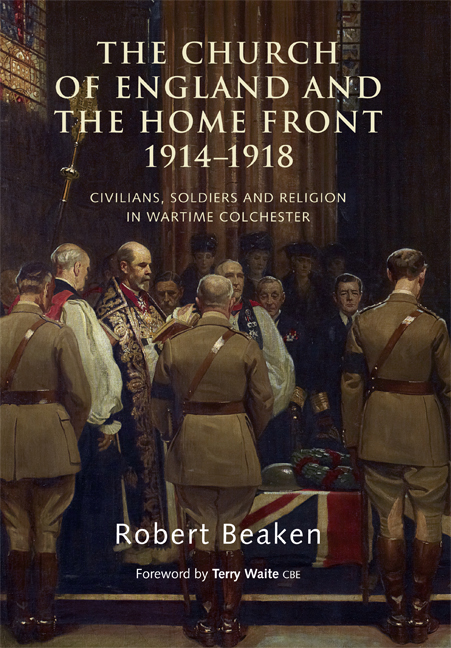 The Church of England and the Home Front, 1914-1918
The Church of England and the Home Front, 1914-1918 Book contents
- Frontmatter
- Dedication
- Contents
- List of Illustrations
- Foreword
- Author’s Acknowledgements
- 1 The First World War – One Hundred Years On
- 2 Colchester
- 3 Wartime
- 4 The Clergy
- 5 The Laity
- 6 Prayer and Worship
- 7 The National Mission of Repentance and Hope
- 8 Thought and Attitudes
- 9 Armistice, Remembrance and Aftermath
- 10 The Church of England and the First World War
- Bibliography
- Index
1 - The First World War – One Hundred Years On
Published online by Cambridge University Press: 11 May 2021
- Frontmatter
- Dedication
- Contents
- List of Illustrations
- Foreword
- Author’s Acknowledgements
- 1 The First World War – One Hundred Years On
- 2 Colchester
- 3 Wartime
- 4 The Clergy
- 5 The Laity
- 6 Prayer and Worship
- 7 The National Mission of Repentance and Hope
- 8 Thought and Attitudes
- 9 Armistice, Remembrance and Aftermath
- 10 The Church of England and the First World War
- Bibliography
- Index
Summary
For the generation that lived, fought and endured between 1914 and 1918, the First World War was frequently understood as nothing less than the ‘Great War for Civilization’. Not for nothing does Lutyen's Cenotaph in Whitehall (erected 1920) bear the inscription ‘Our Glorious Dead’. A very different view of the First World War, as a tragic and cruel waste of young human life (which, of course, it would be impossible to deny), began to arise half a generation later in the late 1920s and 1930s. This was fed by the growth of pacifism and appeasement as the world drifted towards an almost unthinkable Second World War. To take one example, General (later Field Marshal) Sir Douglas Haig, Commanderin- Chief of the British Armies in France between 1915 and 1918, whose reputation was very high as ‘the man who won the war’ between the Armistice in 1918 and his death in 1928, was later portrayed by some as ‘Butcher Haig’, a bogeyman upon whom was focused the blame for what was perceived as the needless loss of hundreds of thousands of young lives on the Western Front. The fact that Great Britain found itself at war Germany again a quarter of a century later added to this view of the First World War as a tragic waste, and as a job only half done, which needed doing again properly.
As the First World War has passed out of living memory, so a more nuanced and balanced understanding has slowly begun to be formulated by historians and writers. Douglas Haig, to continue the example, has started to be reappraised. Although he had his faults, and may be reasonably criticised for some of his decisions, Haig has begun to re-emerge as a better, more gifted and caring commander-in-chief than has long been thought. To take one instance of this change in attitude, the Royal British Legion, which in 1994 had replaced the words ‘Haig Fund’ with ‘Poppy Appeal’ on the black centre of its poppies, in 2009 named its new London headquarters ‘Haig House’.
Similarly, modern research has shown that if Kaiser Wilhelm II's German empire was not as wicked as Hitler's Third Reich, it was still a militaristic, expansionist and constitutionally unbalanced regime, whose soldiers were responsible for inflicting atrocities upon thousands of civilians in Belgium and France during the war.
- Type
- Chapter
- Information
- The Church of England and the Home Front, 1914-1918Civilians, Soldiers and Religion in Wartime Colchester, pp. 1 - 3Publisher: Boydell & BrewerPrint publication year: 2015
